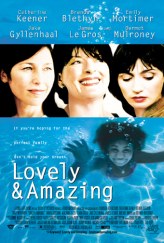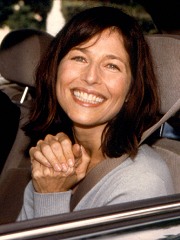|
Lovely & Amazing
|
| |
 |
USA, 2001. Rated R. 92 minutes.
Cast:
Catherine Keener, Brenda Blethyn, Emily Mortimer, Raven Goodwin, Jake
Gyllenhall, Dermot Mulroney, Aunjanue Ellis, Clark Gregg, James LeGros,
Michael Nouri
Writer: Nicole Holofcener
Music: Craig Richey
Cinematographer: Harlan Bosmajian
Producers: Anthony Bregman, Ted Hope, Eric D'Arbeloff
Director: Nicole Holofcener
LINKS
|
 know it's an obvious statement, but there's not much that's lovely and
amazing about Lovely & Amazing. Unlike her critical indie fave Walking
and Talking, writer/director Nicole Holofcener's Lovely & Amazing
is a doggedly low-spirited dramedy whose sporadic laughs and handful of genuinely
affecting scenes are spread too thinly over its modest running time.
know it's an obvious statement, but there's not much that's lovely and
amazing about Lovely & Amazing. Unlike her critical indie fave Walking
and Talking, writer/director Nicole Holofcener's Lovely & Amazing
is a doggedly low-spirited dramedy whose sporadic laughs and handful of genuinely
affecting scenes are spread too thinly over its modest running time.
Lovely & Amazing isn't a good movie. Lovely & Amazing isn't a
bad movie. It's just kind of there. There's a rudimentary story and there's
sort of a point, but neither is developed into a full-fledged anything. I guess
it's what they call of slice-of-life movie, not that anyone would want to order
a slice of the lives depicted.
Touching on both racism and unrealistic body-image ideals, the point seems
to be that women are socialized into being destructively insecure about the
way they look, and that often women themselves play a role in perpetuating these
destructive patterns. To illustrate the point, we have the film's trio of self-absorbed
female central characters: sisters Michelle and Jane Marks and their mother
Elizabeth.
Michelle (Catherine Keener of Being John
Malkovich and Living in Oblivion) is an embittered housewife,
who fancies herself an artist, married to a dissatisfied, disinterested husband
(Clark Gregg of The Adventures of Sebastian Cole).  Jane
(Emily Mortimer of The Kid) is a monumentally neurotic aspiring actor
with a penchant for taking in stray dogs, even ones who aren't actually strays.
Jane's aloof boyfriend (James LeGros of Drugstore Cowboy and Living
in Oblivion) disapproves of her career choice and dumps her. Elizabeth (Brenda
Blethyn of Secrets & Lies and Saving Grace) is having plastic
surgery to flatten her stomach and fantasizes about her surgeon (Michael Nouri
of Flashdance).
Jane
(Emily Mortimer of The Kid) is a monumentally neurotic aspiring actor
with a penchant for taking in stray dogs, even ones who aren't actually strays.
Jane's aloof boyfriend (James LeGros of Drugstore Cowboy and Living
in Oblivion) disapproves of her career choice and dumps her. Elizabeth (Brenda
Blethyn of Secrets & Lies and Saving Grace) is having plastic
surgery to flatten her stomach and fantasizes about her surgeon (Michael Nouri
of Flashdance).
In addition to them, we have Elizabeth's newly adopted eight-year-old African
American daughter Annie (newcomer Raven Goodwin), in whom we see the adults'
neuroses perpetuated. Annie, who is overweight, hears the adults discuss Elizabeth's
surgery as an "improvement," and then insists on having her hair straightened
as an "improvement" of her own. In one of the film's memorable moments, she
declares that she wants to pull her skin off because she wants to be like her
white adoptive mother. In another such moment, Jane stands buck naked in front
of new lust interest, superstar Kevin McCabe (Dermot Mulroney of My Best
Friend's Wedding and, yes, Living in Oblivion), and demands that
he point out her every physical flaw. She's serious, even though the only negative
thing anyone could possibly say about her is that she's a bit skinny--but hey,
aren't actors supposed to be? Meanwhile, thirty-six-year-old Michelle takes
a job at a one-hour photo shop ("it takes about an hour," she awkwardly explains
at a party), where she begins an ill-advised flirtation with her seventeen-year-old
boss (Jake Gyllenhall of Donnie Darko), perhaps because he insists that
she's "cute."
None of these plot threads go anywhere. Once Holofcener's thematic content
is laid on the table, and we're suitably shocked at how screwed up these women
are, and we've gotten the message about how soul-damaging concerns about outer
appearances are, the movie just stops. The women may have grown a bit wiser,
but we're not really sure. They haven't grown any more likeable. Though Holofcener
doesn't seem to have a high opinion of her male characters, you might find them
more sympathetic than she intends. Consider what they're dealing with: at one
point Elizabeth criticizes Jane's boyfriend for not making her feel good about
herself, as if her self esteem is his sole responsibility. Can good self esteem
come from anywhere other than one's own self? The film doesn't argue that good
self-esteem comes from within, just that bad self-esteem comes from without.
Lovely & Amazing will undoubtedly earn heaps of critical praise for
its "uncompromising honesty," or whatever praise independent dramedies such
as this usually garner. The truth is that Lovely & Amazing doesn't distinguish
itself. The guy who exited the screening behind me ostentatiously dispensed
his dismissive quick-take into a cell phone in the manner of a show-biz insider
thusly, "It's an independent movie. It's a small movie. It's not going to make
any money." That's likely how Lovely & Amazing is fated to be remembered,
if it is remembered at all.
*Editor's Note: After seeing this film again, Carlo has raised his
rating to a C+, having appreciated the film's dark humor a bit more the
second time around.
Review
© June 2002 by AboutFilm.Com and the author.
Images © 2002 Blow Up Pictures and Lions Gate Entertainment. All Rights Reserved.

 Jane
(Emily Mortimer of The Kid) is a monumentally neurotic aspiring actor
with a penchant for taking in stray dogs, even ones who aren't actually strays.
Jane's aloof boyfriend (James LeGros of Drugstore Cowboy and Living
in Oblivion) disapproves of her career choice and dumps her. Elizabeth (Brenda
Blethyn of Secrets & Lies and Saving Grace) is having plastic
surgery to flatten her stomach and fantasizes about her surgeon (Michael Nouri
of Flashdance).
Jane
(Emily Mortimer of The Kid) is a monumentally neurotic aspiring actor
with a penchant for taking in stray dogs, even ones who aren't actually strays.
Jane's aloof boyfriend (James LeGros of Drugstore Cowboy and Living
in Oblivion) disapproves of her career choice and dumps her. Elizabeth (Brenda
Blethyn of Secrets & Lies and Saving Grace) is having plastic
surgery to flatten her stomach and fantasizes about her surgeon (Michael Nouri
of Flashdance).
